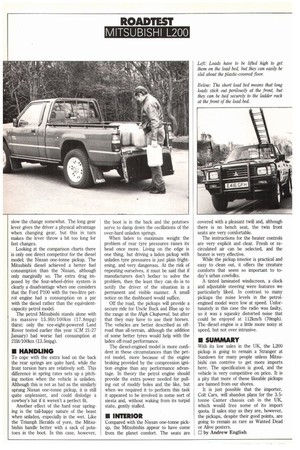ROADTEST VITSUBISHI L200
Page 58

If you've noticed an error in this article please click here to report it so we can fix it.
slow the change somewhat. The long gear lever gives the driver a physical advantage when changing gear, but this in turn makes the lever throw a bit too long for fast changes.
Looking at the comparison charts there is only one direct competitor for the diesel model; the Nissan one-tonne pickup. The Mitsubishi diesel achieved a better fuel consumption than the Nissan, although only marginally so. The extra drag imposed by the four-wheel-drive system is clearly a disadvantage when one considers that the Ford P100 with the two-litre petrol engine had a consumption on a par with the diesel rather than the equivalentcapacity petrol model.
The petrol Mitsubishi stands alone with its massive 15.9lit/100km (17.8mpg) thirst: only the vee-eight-powered Land Rover tested earlier this year (CM 21-27 January) had worse fuel consumption at 211it/1001un (13.5mpg).
• HANDLING
To cope with the extra load on the back the rear springs are quite hard, while the front torsion bars are relatively soft. This difference in spring rates sets up a pitching motion when the vehicle is unladen. Although this is not as bad as the similarly sprung Nissan one-tonne pickup, it is still quite unpleasant, and could dislodge a cowboy's hat if it weren't a perfect fit.
Another effect of the hard rear springing is the tail-happy nature of the beast when unladen, especially in the wet. Like the Triumph Heralds of yore, the Mitsubishis handle better with a sack of potatoes in the boot. In this case, however, the boot is in the back and the potatoes serve to damp down the oscillations of the over-hard unladen springs.
When laden to maximum weight the problem of rear tyre pressures raises its head once more. Living on the edge is one thing, but driving a laden pickup with unladen tyre pressures is just plain frightening, and very dangerous. At the risk of repeating ourselves, it must be said that if manufacturers don't bother to solve the problem, then the least they can do is to notify the driver of the situation in a permanent and visible manner. A small notice on the dashboard would suffice.
Off the road, the pickups will provide a secure ride for Uncle Buck and Blue up to the range at the High Chaparral, but after that they may have to use their horses. The vehicles are better described as offroad than all-terrain, although the addition of some better tyres would help with the laden off-road performance.
The diesel-engined model is more confident in these circumstances than the petrol model, more because of the engine braking provided by the compression ignition engine than any performance advantage. In theory the petrol engine should provide the extra power needed for pulling out of muddy holes and the like, but when we required it to perform this task it appeared to be involved in some sort of siesta and, without waking from its torpid state, gently stalled.
IN INTERIOR
Compared with the Nissan one-tonne pickup, the Mitsubishis appear to have come from the planet comfort. The seats are covered with a pleasant twill and, although there is no bench seat, the twin front seats are very comfortable.
The instructions for the heater controls are very explicit and clear. Fresh or recirculated air can be selected, and the heater is very effective.
While the pickup interior is practical and easy to clean out, it offers the creature comforts that seem so important to today's urban cowfolks.
A tinted laminated windscreen, a clock and adjustable steering were features we particularly liked. In contrast to many pickups the noise levels in the petrolengined model were low at speed. Unfortunately in this case the radio was faulty, so it was a squeaky distorted noise that could be enjoyed at 112km/h (70mph). The diesel engine is a little more noisy at speed, but not over intrusive.
• SUMMARY
With its low sales in the UK, the L200 pickup is going to remain a Stranger at Sundown for many people unless Mitsubishi can contrive to get more imports here. The specification is good, and the vehicle is very competitive on price. It is a pity that more of these likeable pickups are banned from our shores.
It is just possible that the importer, Colt Cars, will abandon plans for the 3.5tonne Canter chassis cab in the UK, which would free some of its import quota. If sales stay as they are, however, the pickups, despite their good points, are going to remain as rare as Wanted Dead or Alive posters.
• 0 by Andrew English
















































































































































